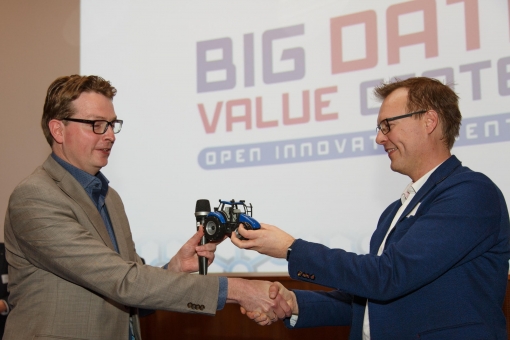
The Dutch platform for Linked Data (PLDN) is media partner for Semantics 2017. Over the last 5 years Erwin Folmer was the ‘trekker’ of the platform. The Dutch word ‘trekker’ can be translated to ‘leader’ or ’chair’ as well as to ‘tractor. Erwin guided the development of the platform into the vibrant community it now is: a community dedicated to fostering the use of linked data. Recently Alwin Sixma took over his role as community manager of the platform. Erwin is working for the Kadaster, The Netherlands’ Cadastre, Land Registry and Mapping Agency. Alwin is an associate of the Big data Value Center, an open innovation platform for value creation with (big) data. We had a brief talk with Alwin and Erwin.
Can you tell something about PLDN and its concrete results?
PLDN is a community of professionals who share an interest in bringing forward technologies and applications of linked data. With the Platform Linked Data Netherlands we want to bring the knowledge and use of linked data to a higher level. The vibrant community uses the platform to share knowledge and explore applications. PLDN is funded and supported by several founding partners and sponsors. Over the last five years PLDN organised many exchanges, workshops and meetings. It also produced several publications on relevant topics. The plans for the future include branching out toward a broader base of members and applications in different sectors.
Which trends and challenges you see for linked data/semantic web in the Netherlands?
More and more we see government agencies and companies discovering the value of data. Most of the added value is found in the combination of datasets and often in collaboration with other organizations. Linked data is a method of publishing structured data so that it can be interlinked and become more useful through semantic queries. As such linked data is a very powerful instrument. But it needs careful implementation. We stress the importance of semantics and provenance. Semantics specifies the meaning of the linked data. Provenance its origin, purpose, quality etc. Semantics and provenance, if treated properly prevent accidents as a result of misguided decisions on the basis of misinterpretation of data.
We also need practical and useable standards for linked data implementations to prevent miscommunication and accidents.
What are your expectations about Semantics 2017 in Amsterdam?
The program looks quite promising. We are looking forward to it. Allow us to also pitch the workshops we are facilitating on September 11th. We will facilitate sessions about standardisation and Large scale Public Administration data processing for smart city purposes. Please keep an eye out for the opportunity to register for these sessions. We think they will prove worth your while..!
One personal question: how are the two of you linked other than as being chair of PLDN?
In several ways. We used to be colleagues at TNO, the Dutch independent research organization. TNO advises clients on how they can improve their competitiveness, the economy and society as a whole. We are also linked in our common ambition to further societal goals by amongst others data.